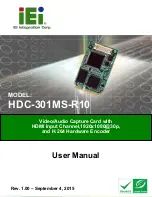
KPCI-3101 — KPCI-3104 Series User’s Manual
NOTE
When you stop an analog input operation, a final block of two samples is
transferred even if only one sample is required. The host software
ignores the extra sample.
DriverLINX accesses the KPCI-3101–4 hardware circular buffer to fill user buffers that you
allocate in software. It is recommended that you allocate a minimum of three buffers for analog
input operations, and the stop events controlling them. Refer to DriverLINX manuals for more
information.
•
If “Counter/Timer Event” is specified, data is written to the allocated buffers until no more
empty buffers are available; at that point, the operation stops.
•
If “Command,” “Digital,” or “Analog” event is specified, data is written to the allocated mul-
tiple buffers continuously; when no more empty buffers are available, the board overwrites
the data in the filled buffers starting with the first location of the first buffer. This process
continues indefinitely until you stop it.
•
If you set “Buffers=1” in DriverLINX, (usually not recommended for analog input opera-
tions), data is written to a single buffer continuously; when the buffer is filled, the board
overwrites the data in the buffer starting with the first location of the buffer. This process
continues indefinitely until you stop it.
Error conditions
The KPCI-3101–4 Series board can report the following analog input error conditions to the host
computer:
•
A/D Over Sample — Indicates that the A/D sample clock rate is too fast. This error is
reported if a new A/D sample clock pulse occurs while the ADC is busy performing a con-
version from the previous A/D sample clock pulse. The host computer can clear this error. To
avoid this error, use a slower sampling rate.
•
Input FIFO Overflow — Indicates that the analog input data is not being transferred fast
enough from the Input FIFO across the PCI bus to the host computer. This error is reported
when the Input FIFO becomes full; the board cannot get access to the PCI bus fast enough.
The host computer can clear this error, but the error will continue to be generated if the Input
FIFO is still full. To avoid this error, close other applications that may be running while you
are acquiring data. If this has no effect, try using a computer with a faster processor or reduce
the sampling rate.
•
Host Block Overflow — Indicates that the host computer is not handling data from the
board fast enough. This error is reported if the board completes the transfer of a block of
input data to the circular buffer in the host computer before the host computer has finished
reading the last block of data. The host computer can clear this error. To avoid this error,
ensure that you allocated at least three buffers at least as large as the sampling rate; for exam-
ple, if you are using a sampling rate of 100kSamples/s (100kHz), specify a buffer size of
100,000 samples).
If any of these error conditions occurs, the board stops acquiring and transferring data to the host
computer.
NOTE
DriverLINX reports any of these errors as a “DATA LOST” message.
Summary of Contents for KPCI-3101 Series
Page 10: ...iv...
Page 15: ...1 Overview...
Page 21: ...2 Principles of Operation...
Page 53: ...3 Installation and Configuration...
Page 78: ...3 26 Installation and Configuration KPCI 3101 KPCI 3104 Series User s Manual...
Page 79: ...4 Testing the Board...
Page 82: ...4 4 Testing the Board KPCI 3101 KPCI 3104 Series User s Manual...
Page 83: ...5 Calibration...
Page 86: ...5 4 Calibration KPCI 3101 KPCI 3104 Series User s Manual...
Page 87: ...6 Troubleshooting...
Page 94: ...6 8 Troubleshooting KPCI 3101 KPCI 3104 Series User s Manual...
Page 95: ...A Specifications...
Page 107: ...B Connector Pin Assignments...
Page 111: ...C Systematic Problem Isolation...
Page 145: ...This page intentionally left blank...
Page 146: ...Keithley Instruments Inc 28775 Aurora Road Cleveland Ohio 44139 Printed in the U S A...
















































